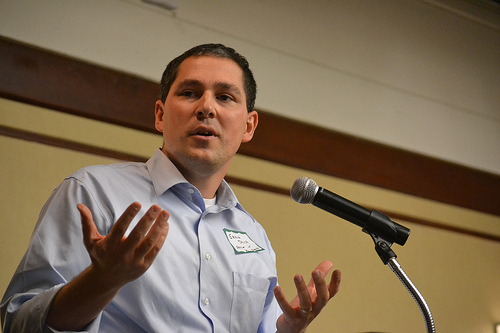
Addressing the climate crisis with a Robin Hood Tax
As president of Friends of the Earth U.S., I am proud to support, on behalf of our more than 250,000 members and activists and in solidarity with our friends from numerous activist organizations, a Robin Hood Tax.
Friends, if it isn’t all ready clear, we are in this together. The global economic crisis, largely created by the various entities we want to tax, has forced austerity measures in both the European governments and the United States. These measures are impacting our capacity to create positive change and solve some of the pressing issues of our time — climate change, education, and access to medicines and public health doctors.
From the climate change perspective, we need a Robin Hood Tax. Around the world, communities are suffering as global warming pollution — for which they are not responsible — wreaks havoc with their local climates. Heat waves in Asia and Europe are increasing in frequency; wildfires are raging in Australia (heck, in Australia they needed to create a temperature color to represent 130 degree temperatures). In Africa, temperatures are increasing, there are more floods and droughts and, consequently, failing agriculture. Island nations like the Maldives are slowly sinking into the ocean. The net impact will be increasing conflicts and food insecurity, which threatens the lives and livelihoods of many millions.
At home, we are all aware of the chaos and destruction Superstorm Sandy brought just last year. While devastating, New York and New Jersey will rebuild. It is the 130 communities in Alaska that, like the island nations, are sinking into the ocean. A place like Newtok, Alaska, will have to relocate its entire village at a cost of $130 million.
Around the world we are seeing the first signs of climate refugees.
Why is this relevant to the groups supporting a Robin Hood Tax? The obvious answer is that the impacts of global warming pollution will impact each and every one of us, from the air we breathe, to the food we eat, to the places that we live. In thinking more deeply on the issues Robin Hood Tax advocates are working on, we realize that all our issues are interconnected and that climate change will hugely impact many of them. Many of the major infectious diseases, such as diarrheal diseases, malnutrition, malaria and dengue are highly climate-sensitive and are expected to worsen as the climate changes.
There are also the financial practicalities of tackling climate change. It is going to take hundreds of billions — even trillions — of dollars to help communities adapt to and reduce their global warming pollution. In short, it is going to be enormously expensive.
The global response to funding this unmet demand has been anemic. The leaders of the world pledged $100 billion to start helping communities adapt to climate change or to reduce their carbon pollution. Unfortunately, instead of creating new monies and revenues, existing funds for development assistance, safe drinking water, education, healthcare access, improved disaster relief and micro-finance (to name a few) are being repurposed or reclassified for this $100 billion effort. Essentially, the governments of the world are creating either the world’s largest funding Ponzi scheme or simply robbing from Peter to pay Paul, with the lives millions of people on the line.
Even more insidious, the governments of the world think that private investors, the same folks that created the economic mess, will be able to contribute to the $100 billion. They plan, essentially, to privatize and and create profit from people’s suffering.
This is why I and Friends of the Earth are fighting for a Robin Hood Tax. The response to the global climate crisis should not be privatized, nor should it be allowed to pillage other efforts for financial resources. We do not have a financial problem as much as we have a leadership problem. A leadership problem that we can all overcome together.
It’s time we make good. It’s time we make good to make sure we leave a livable planet for our children and grandchildren and great grandchildren. Whether you live in New Orleans, New York, Nigeria or Nepal, we’re all going to be impacted by climate change, and we’re all in this together. The fight against the climate crisis is a fight for global health, a fight against global poverty, a fight for good green jobs, a fight for education and most importantly, a fight for justice. I am inspired and proud to be working along side the National Nurses Union, National Peoples Action, Student Global Aids Campaign, Vocal-New York and the many others doing this important work.
(The above blog post was adapted from a speech given by Friends of the Earth President Erich Pica at the 2013 Robin Hood Tax Action Conference)
Image credit: Robin Hood Tax USA, Flickr
Related Posts
Ways to Support Our Work

Read Latest News
Stay informed and inspired. Read our latest press releases to see how we’re making a difference for the planet.

See Our Impact
See the real wins your support made possible. Read about the campaign wins we’ve fought for and won together.

Donate Today
Help power change. It takes support from environmental champions like you to build a more healthy and just world.